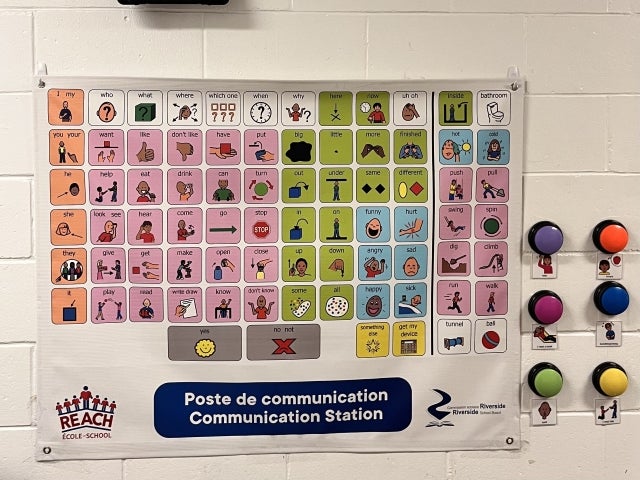REACH School builds communication stations

Communication is a priority for the students who attend REACH School (of the Riverside School Board) in St. Lambert, however ensuring that students have Augmentative and Alternative Communication (AAC) tools has not always been easy. The Speech-Language Pathology (SLP) team has been working hard over the last few years to tailor and model the use of AAC from low tech to high tech for their students. In November, they built a version of a core board including words for outdoor play, which have been installed at three of its four campuses. This year, the SLPs aim to build a Communication Station to provide students with unlimited access to AAC.
Alexandra Di Lallo is a speech-language pathologist with the Riverside School Board.
About core boards
Core boards are word boards used in many different settings including schools, explains Alexandra Di Lallo. They typically display about 50 high-frequency words, including nouns, verbs and adjectives, which can be used in different combinations to make a variety of messages. The words are usually colour-coded to help the user navigate and learn the placement of words.
Team creates learning module on dyslexia for educators
by Joanna Mckay, Rebecca Dorner and Courtney Paul
The dedicated Inclusive Schools Network (ISN) team has developed an online professional development learning module on dyslexia to support educators and professionals. It is the first module in a planned three-part series and explores the intricacies of reading: how it works, where it can break down for individuals with dyslexia and the steps for identification. Participants learn about the history and definition of dyslexia, along with key reading models to deepen their understanding of reading challenges.
Accessible to anyone but aimed at teachers, consultants and professionals, the module is educational, encouraging reflection and improved teaching practices. Subsequent modules will also equip educators with techniques to support dyslexic learners.
Joanna Mckay is Inclusive Schools Network coordinator; Rebecca Dorner and Courtney Paul are speech-language pathologists, all with the Riverside School Board.
About REACH
Riverside School Board’s REACH school in St. Lambert provides a specialized environment and adapted curriculum for students with neurodivergent profiles between the ages of 4 and 21. Its students attend school in one of its two dedicated buildings or in the satellite classes in REACH Saint-Lambert International High School and REACH Centennial Regional High School.









